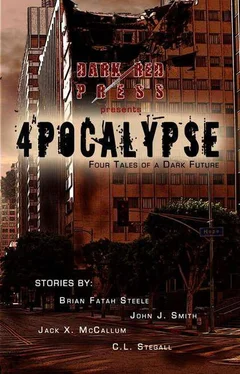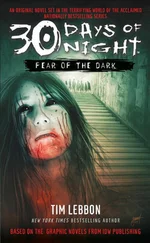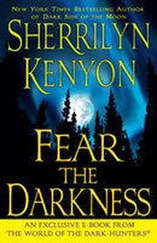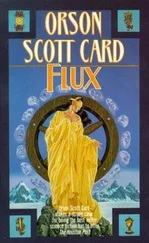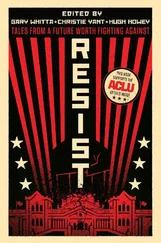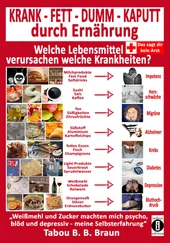The smiling infected, already being referred to as grins or happyfaces, were hard to put down. They were highly resistant to pain and could only be killed with a headshot that destroyed the brain, or multiple wounds that caused a massive bleed-out. This of course heightened the hysteria. Talk of zombies could not be quelled by any public servants, including the President, who had pleaded for calm and civil order until televisions were showing nothing but local emergency broadcast updates.
By the time I was able to leave our building, four days after Jillian found me and almost a week since the infection reached California, there was nowhere to go. The power was out, and so was our cable service. Our internet was out as well; we got both services from Comcast. There wasn’t much on the radio. Two very faint broadcasts that must have come from pirate radio stations told us to either embrace the infected and work with them toward a common understanding, or to shoot the grinning plague-bearers, fuckin chinks, looting niggers, peace-loving faggots, fascist cops, chickenshit Mexicans, and all the goddamned Democrats. Someone was still broadcasting from the KCBS studios on Battery Street.
The peninsula that is San Francisco and San Mateo counties is like the fist on the end of an arm thrust out from the California coast and pointing due north. The arm is San Mateo County. The fist is the city and county of San Francisco. On either side of the narrowest part of the peninsula, the wrist, so to speak, are the city of Pacifica on the Pacific Ocean, and San Francisco International Airport on San Francisco Bay. We learned from KCBS that there were fires burning from Pacifica to SFO, a wall of fire ten miles long.
The Golden Gate Bridge was on fire as well. We saw that when we went up on the roof of our building. I couldn’t tell what was burning, the bridge was steel and concrete, but we could see the flames and lots of thick smoke as if the bridge had been piled high with old tires that had been set alight. Beyond that we could see a swath of dark clouds rolling in from the sea and obscuring the stars. The Bay Bridge had been barricaded by the Navy and civilian engineers. Rumor was that the city was going to be carpet-bombed to wipe out the infection when it was realized that geography could help contain the spread of the disease, so the fires were started. The grins couldn’t or wouldn’t swim, and they sure as hell couldn’t walk through fire. They were trapped in the city.
And we were trapped with them.
The frightened young man at KCBS told listeners to, “Get out of the city any way you can. The armed forces are pulling out, and when they are gone, anyone who has survived is on their own. Get out now. As long as the army is here, they are here to help. And whatever you do, don’t smile.”
We decided to walk downtown, to the heart of the city. If there was anyone in authority they would have to be there. A lot of businesses had a lot of money invested in property there; surely that would be worth protecting. And we would be right along the route of retreating soldiers and fleeing civilians heading for the bay and any boats still crossing the water.
We waited until night, hoping it would be safer, each of us carrying a backpack with a few things, a transistor radio, clothes and some food. For the first time in my life I wished I had a gun. Instead, Jillian carried a baseball bat, and I wore a sword off of one hip, in a cheap leather scabbard. I felt ridiculous.
I bought the sword in college because I was young and stupid and thought it was a cool thing to have, and through the years it stayed hidden in boxes of junk in the back of one closet after another. It looked like a Roman gladius. The blade was two feet long, the hilt was old wood, and there was no crossguard. It had been over one hundred and fifty years old when I bought it. There were chips and pits in the blade, and the maker had stamped his mark in the steel, a rose.
When I pulled the sword out of the closet I first considered strapping it to my back. I’d seen that kind of thing in movies, where guys did an over-the-shoulder draw of a weapon, a sword or a shotgun. I quickly realized that unless I had arms like an orangutan, that kind of draw could be clumsy and time-consuming. I didn’t want to accidentally slice off an ear before beginning a fight for survival.
We reached Van Ness Avenue, which was filled with abandoned cars and buses. Even if we could find a car we couldn’t drive it anywhere; all the main streets were blocked with empty vehicles. If there were any bike messengers left in the city they were now the kings of the road. We walked to Sacramento Street, and then up the hill to Mason Street, where we saw flames in the windows of the stately old Fairmont Hotel.
There was fog over the bay, and no lights on the Bay Bridge. What we could see of downtown was dark. To the east and west we could hear gunshots. We started down the hill, passing a cable car lying on one side at Powell. A big canvas-covered truck was coming up the hill. The truck was painted Army green. Jillian took a blue bandana out of her pack and told me to wear it over my mouth and nose, bandit style. When I asked her why, she said, “If any soldiers see you from the wrong side they might shoot you on sight.” Being a dumbass, I hadn’t even considered that. She put one on as well, a pink one.
The truck roared past us. Someone in the back of the truck was shrieking, hidden from us by canvas flaps.
A red flare silently rose up and over the bay, a pinpoint of ruby light.
The power was out all over the city, but we saw the flicker of flashlights and candles in a few apartment windows. We listened to the radio as we walked down the hill, but there were no more broadcasts.
We had to squeeze past a near solid line of cars at Sacramento and Stockton. The cars were abandoned, but some had their headlights on.
A slender teenage girl darted from the black hole of the Stockton Tunnel and ran toward us. Her hair was blonde and it danced behind her. Her grin was so wide it looked as if her lips had been surgically removed. There was a cunning hunger in her eyes. She was wearing a t-shirt and denim shorts and sneakers. I couldn’t move. I saw that she was a threat, but I also saw how young she was, how pretty she had been. She was just a kid.
Jillian stepped between us and swung the bat. The girl let out a clotted cry as the lower part of her face was shattered. Jillian swung again and the girl’s jawbone spun into the air like a meat boomerang. Jilly swung the bat a final time, up and over, bringing it down on the girl’s head. There was a horrible, horrible wet crunch and the girl fell on her side. Blood that was too dark and too thick oozed like molasses from her crushed skull.
“You need to stay sharp, honey,” Jillian said. “That smile means it’s no longer a person. It’s just a thing that needs to be put down.”
We continued down Sacramento Street, passing a group of thirty or forty people heading away from downtown. They thought we were crazy going in that direction.
Some people said the infection had come from China. Chinatown was being burned to the ground; we could see that as we passed Waverly Place. Smoke filled the air. Firelight bounced off of the smoke and illuminated the street. Someone shouted, “Chink roast!” and let out a high-pitched laugh.
Some said that the infection was just reaching the Far East. Most European capitals were in flames, according to an older black man leading a young girl and boy up the hill. “This disease is eating the world,” he said. He told us he was taking his grandchildren to Grace Cathedral. Glide Memorial was their church, but it had filled quickly with sick and injured people and had been burned down by the Army.
Читать дальше
